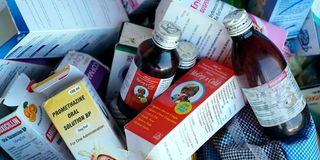Another warning as cough syrups kill 18 children

A photograph shows collected cough syrups in Banjul on October 06, 2022. - Indian authorities are investigating cough syrups made by a local pharmaceutical company after the World Health Organisation said they could be responsible for the deaths of 66 children in Gambia.
What you need to know:
- The two products linked to the death of children in Uzbekistan go by the brand name AMBRONOL syrup and DOK-1 Max syrup.
- WHO conducted an analysis of the products that were sold in the Republic of Uzbekistan and found out that they had ‘unacceptable’ amounts of chemicals called diethylene glycol and ethylene glycol.
The World Health Organization (WHO) has issued a second warning against the use of two types of cough syrups produced in India following the death of about 18 children in Uzbekistan, Central Asia.
WHO termed the medicines as ‘substandard’ and ‘contaminated’ as they fail to meet quality standards.
This follows an earlier warning on the use of four other cough syrups that were reported to have killed about 60 children in Gambia late last year. WHO warns that the drug is sold over the counter and most people are likely to buy it without a prescription from a medical doctor. The two products linked to the death of children in Uzbekistan go by the brand name AMBRONOL syrup and DOK-1 Max syrup.
WHO conducted an analysis of the products that were sold in the Republic of Uzbekistan and found out that they had ‘unacceptable’ amounts of chemicals called diethylene glycol and ethylene glycol.
These two chemicals were also found in the Gambian syrups last year and are known to have fatal impacts on human beings when ingested. WHO advised manufacturers, especially those that produce syrups, to check for the presence of contaminants in their products.
“All medical products must be approved and obtained from authorised or licensed suppliers. The products’ authenticity and physical condition should be carefully checked. Seek advice from a healthcare professional when in doubt,” warned WHO.
Kenya’s Pharmacy and Poisons Board, which is responsible for drugs’ regulation, told Healthy Nation it has received a notice on the said syrups and clarified that the products are not registered in the country.
“The PPB has implemented active surveillance of cough preparations and promethazine syrups on the Kenyan market. We have sampled several batches of various cough preparations and promethazine syrups and submitted them to quality control laboratory for analysis. We await laboratory results which will inform regulatory action,” said the PPB.





